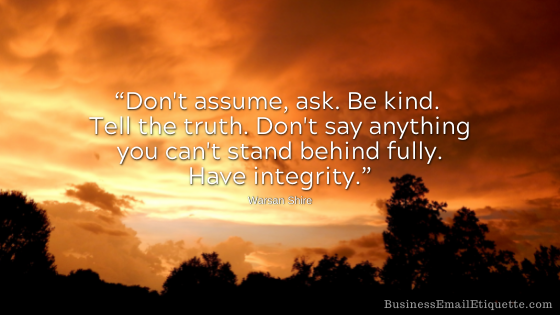Jumping to Conclusions = Poor Impression

It happens every day… Business onliners assume they know what someone means based on how they interpret the words in an email (or, worse, a text). So they jump to a conclusion, sometimes incorrectly. That then leads to strained relationships, loss of opportunities, and even terminated partnerships.
All because someone jumped to conclusions.
When you jump to conclusions, you infer much more than you may realize. Therefore, jumping to incorrect conclusions in your business emails can cause embarrassment or show an inability to communicate cognitively with the written word.
I’ll share with you a recent situation.
I was contacted by an individual that wanted to interview for an article in a big-name magazine. I’ve done quite a few magazine and radio interviews. But even with that, I cannot know who these reporters or writers are. (Or, as it was in this case, how important they think they are.)
As usual, I immediately replied professionally, courteously, and helpfully. I noted that I looked forward to working with the contact for the article with the details they had requested for us to hook up and chat.
Moments later, down comes a second email from this individual.
While this interview request was related to Business Email Etiquette issues, their request came through my other site covering everyday email etiquette. Guess they didn’t notice the link to Business Email Etiquette on the top of every page on that website.
NetManners.com receives a healthy amount of inquiries that are either off-line etiquette questions (not email etiquette related) or, since teachers use my site as a reference, requests from students to provide answers to their homework questions. So I have an autoresponder in place to address those inquiries.
Taking Generalities Personally
Well, this reporter had received my automated response, which states clearly in caps at the top that it is just that — “THIS IS AN AUTOMATED REPLY.” The autoresponder explains that due to all the spam, off-line etiquette questions, and email from students who want answers to their homework instead of reading my site, only “relevant site visitor emails about everyday email etiquette will be responded to.”
The email from the reporter was accusatory and condescending. It was clear she did not read the entire message and then chose to take my autoresponder personally. Didn’t I know who she was? (I didn’t — I had never heard of her before.)
This person was not asking off-line etiquette questions, nor were they a student trying to avoid doing their homework. So why such a visceral reaction? Because they only read part of the autoresponder.
What is at the root of most online misunderstandings? Not reading emails in their entirety. Or reading things into an email that just are not there.
Otherwise, this particular individual wouldn’t have jumped to the wrong conclusion. Instead, they chose to put the message in the context of “She may not respond to ME? The nerve!”
Here is a perfect example of how someone can read into an email what isn’t there or intended by not reading an email in its full context. Compounding that, this person read more into it than the words stated. Then, they inserted their ego into a message that had nothing to do with them.
Misunderstandings = Opportunities
I learned something too. It amplifies the fact that many folks don’t read emails in their entirety and that I also need to make my message even more precise. So I reworded and rearranged the text in my autoresponder.
Every misunderstanding can be an opportunity to improve what is in your control to control. So if there is a way for me to avoid misunderstandings, I’ll do the best I can.
There was no reason to jump to the conclusion this person did. And I didn’t feel the need to point that out. I took the high road and ignored her reactionary response. I imagine she might have been slightly embarrassed when she discovered my response to her right after the autoresponder.
She chose to flex her ego in a way that certainly didn’t portray herself in an attractive light. While we proceeded with the interview via email, I was not offered an apology for her initial accusatory overreaction, which in the end, left me with a negative impression.
Don’t Jump to Conclusions
Read emails in their entirety — twice if you need clarification. Don’t personalize things that are not directed at you. Don’t accuse or assume if you are unsure of intent or tone. All you have to do is kindly ask for clarification.






